外研版-英语-九上-九上Module9 3单元 教案
外研版初中英语九年级上册教案:Modue9-Unit 3
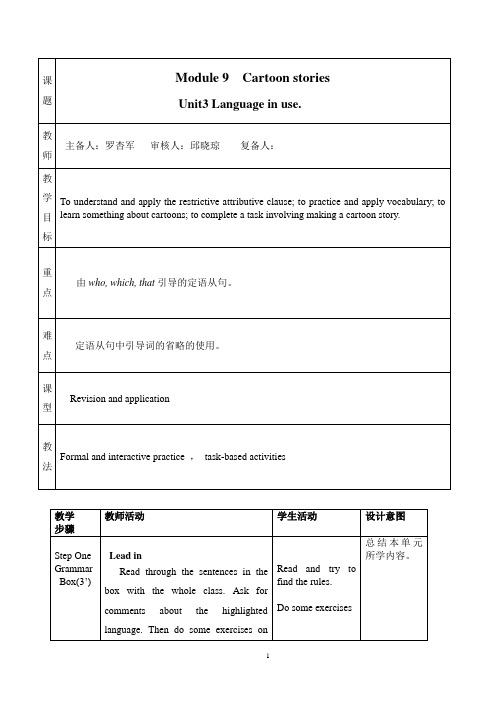
2.To choose the best groups.
让学生做自由发言,培养学生自主学习,自主总结的良好学习习惯。
简短的评价使学生的课堂表现得到肯定并且可以激励学生的学习兴趣,树立学习英语的信心。
Step Six
Home-
work
(1’)
Finish Learning Plan Exx.
pelete the converstion with the correct phrases in the box. Read through the phrases in the box with the whole class and have them repeat them chorally and individually. Ask the students to complete the activity individually, then check witha partner. Call back the answers from the whole class as complete sentences.
课题
Module 9 Cartoon stories
Unit3 Language in use.
教师
主备人:罗杏军审核人:邱晓琼复备人:____________
教学目标
To understand and apply the restrictive attributive clause; to practice and apply vocabulary; to learn something about cartoons; to complete a task involving making a cartoon story.
外研版新九年级上英语教学案9ARM3教学案

第一部分学习要求:学习目标:1、知识和技能目标1).话题:Famous people2)语音:能够掌握长句子的断句。
3)词汇:学会正确使用本单元单词。
4)语法:能够综合运用原因、目的、结果状语从句。
5)功能:能够介绍自己心目中的名人,并能够解释原因。
2、技能目标:1. 能够通过阅读了解英雄人物的生平,并对重要事件按时间顺序排序。
2.能够根据时间轴提示写一篇文章介绍袁隆平。
3. 能够写一篇文章,向他人介绍自己心目中的英雄人物。
3、学习策略:学会预习,学会合作。
4、情感、态度和价值观目标:能够通过阅读名人传记,学英雄人物,从中懂得做人的道理,用于担当,甘于奉献,体验人生价值的真谛。
学习重点:能够综合运用原因、目的、结果状语从句。
学习难点:能够向他人介绍自己心目中的英雄人物。
学法指导:1.课前通过自学单词和预习课文,解决学案中的问题。
2.课上通过合作探究、展示交流,解决重难点。
3.课后自我总结归纳。
第二部分学习过程:一、根据汉语写单词:加拿大_________________加拿大的;加拿大人旳_________________(感觉)不适的,生病的_________________军人;士兵 _________________医治;治疗 _________________战争_________________伤;伤口 _________________受伤的 _________________了解;意识到 _________________垂死的;即将死亡的_________________照顾;照料 _________________工具;器械 _________________发明;发明物_________________ 有用的;有益的_________________休息;睡眠_________________他自己_________________做成;(尤指)设法完成_________________手术_________________(使)继续_________________名言警句:While there is life ,there is hope.只要生命存在,就有希望。
外研版九年级英语上册教案:Module9Unit3Languageinuse

2.教学难点
-词汇的准确运用:学生可能难以区分和正确使用描述性词汇,如“attractive”和“beautiful”的细微差别。
4.提升学生的学习素养:通过自主、合作、探究的学习方式,培养学生主动参与、积极思考、乐于分享的学习态度,提高学生的自主学习能力和团队协作精神。
三、教学难点与重点
1.教学重点
-核心词汇和表达:本节课的核心内容是描述人物外貌和性格的词汇,如"attractive", "friendly", "outgoing", "imaginative", "creative"等。教师应重点讲解这些词汇的用法和搭配,确保学生能够准确运用。
3.重点难点解析:在讲授过程中,我会特别强调词汇的准确运用和过去简单时态的构成。对于难点部分,我会通过举例和对比来帮助大家理解。
(三)实践活动(用时10分钟)
1.分组讨论:学生们将分成若干小组,每组讨论一个与描述人物相关的实际问题,如如何在英语日记中描述昨天的一次聚会。
2.实验操作:为了加深理解,我们将进行一个简单的角色扮演活动。这个活动将演示如何在实际对话中使用所学词汇和时态。
外研版九年级英语上册教案:Module9 Unit 3Language in use
一、教学内容
外研版九年级英语上册教案:Module 9 Unit 3 Language in use
本节课我们将围绕以下内容展开教学:
1. Review and practice the vocabulary and expressions related to describing people's appearance and personality, such as "attractive", "friendly", "outgoing", "imaginative", and "creative".
九年级英语上册 Module9 Unit3 Language in use教案 外研版

课题Module 9 Unit 3 课型Readingandwriting第 3 课时教学目标知识目标To grasp the grammar “The Atributive Clause”To grasp s ome phrases in t his unit.能力目标To use “which/who/that” very freely.情感目标To learn foreign culture of some countries。
内容分析重点The Atrributive Clause.The points in this unit.难点Toget some metrials through learning t his unit。
关键点Key voc abulary-The words, the phrasesK ey structures- The restrictive att ributive clause with tha t, whoand which.教法学法OHP教具学具OHP, Multimedia教学程序教材处理师生活动时间Step 1:Go over the grammar ofthis unit.Step 2:Looking and making upthe story.Step 3:Use the attributiveClauses very freely(Activity 2---Activity 4)Step 4:look, order anddescri beAt first, get a few students to make upseveral sentences with“ that/which/who”.and then get all theclass to go over the grammar.Look at the pictures in Activity 1, makeup a story according to the pictures ,thestudents must insert “which/who/that”where it’s possible.Activity 2: Join the sentences with”which/that/who”, if necessary.Activity3: Look at the pictures andcomplete the senten ces.Activity4: Choose the best answers.Get the students to do these by themselvesat fi rst, then show the right answ ers tothem and get them to correct their ownanswers.If they have any question, please ask theteacher.Step 5: listening practiceStep 6:Go ov er the words and expressions in this moduleStep 7:Around the world Step 8:Homework for today Get the students to look at the pictures in Activity 6, talk about them with their partners and then order them.At last, get them to describe the pi ctures in English.Listen to the tape and check if their answers are right, then answer the questions in Ac tivity 7.Get the students to do Activities 8 and 9.Check their answers.Get the students to read the passage and try their best to understand it.Find out the importances.Underline the sentences that they cannot understand very clearly.板书设计 The new words in this unit.The important points in this unit.教学后记。
外研版九年级英语上册 Module 9 Unit 3优质教案
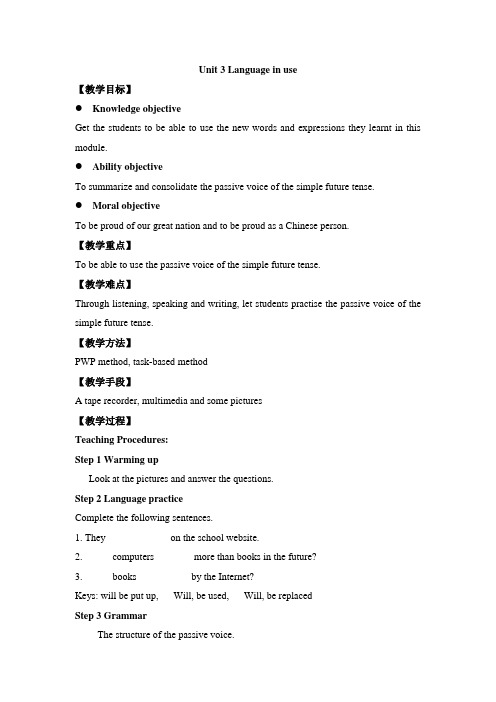
Unit 3 Language in use【教学目标】●Knowledge objectiveGet the students to be able to use the new words and expressions they learnt in this module.●Ability objectiveTo summarize and consolidate the passive voice of the simple future tense.●Moral objectiveTo be proud of our great nation and to be proud as a Chinese person.【教学重点】To be able to use the passive voice of the simple future tense.【教学难点】Through listening, speaking and writing, let students practise the passive voice of the simple future tense.【教学方法】PWP method, task-based method【教学手段】A tape recorder, multimedia and some pictures【教学过程】Teaching Procedures:Step 1 Warming upLook at the pictures and answer the questions.Step 2 Language practiceComplete the following sentences.1. They ____________ on the school website.2. _____ computers _______ more than books in the future?3. _____ books __________ by the Internet?Keys: will be put up, Will, be used, Will, be replacedStep 3 GrammarThe structure of the passive voice.Step 4 Complete the sentences and conversations with the correct form of the words and expressions in brackets1. ____ books ________ (replace) by computers in the future?2. My bike is broken. It _________ (fix) tomorrow.3. —Dad, can I use the Internet this evening?—Yes, but the computer is not on yet. The electricity ___________ (not connect) until nine o’clock.4. _____ the problem _____________ (talk about) at the meeting tomorrow?5. Who ____________ (invite) to give a report about great inventions next Friday?6. —When _____ the work __________ (finish)?—In two days.Keys: 1. Will, be replaced 2. will be fixed 3. won’t be connected4. will be talked about5. will be invited6. will, be finishedStep 5 Look and sayLook at the pictures and describe the new classroom that will be built. Use the words in the box to help you.A new classroom will be built.Keys: A new floor will be built.New furniture (desk/ chairs) will be bought.A new blackboard will be bought.A new interactive whiteboard will be bought.The windows and the door will be changed.The teacher’s desk will be painted.The lights will be changed.The color of the walls will be changed.The walls will be fixed.Step 6 TalkingWork in pairs. Talk about these great inventions.●1875●America●Alexander Graham BellA: When was the telephone invented?B: It was invented in 1875.…A: What kind of telephone do you think will be made in the future? B: …●1903●America●Wright Brothers●1924●Britain●John Logie BairdStep 7 Complete the sentences with the words in the box1Before the ___________ of printing, few people could read.2There were more books to sell, so the _____ in books grew.3Because more people could read, ideas ______ quickly.4What ________ will printing take in the future?Keys: introduction, trade, spread, directionStep 8 Listening1. Listen and find out where the speaker is.a). In a school library.b). In the British Library.c). In the British Museum.Keys: b2 .Listen again and answer the questions.1. Why were so few books produced in ancient times?2. Why were many old books copied onto a computer?3. How has the computer helped people read old books in the British Library?Keys: 1. Because they were written by hand.2. They are too valuable to be picked up and held in the hand.3. Old books were copied onto a computer a few years ago for people tobe able to read them without touching them.Step 9 Reading1.Read the passage and choose the best title.a) The history of the Internetb) The World Wide Webc) The Internet and the Webd) The future of the InternetKeys: c2.Read the passage and answer the questions.1. When was the Internet invented by the US government?2. What could people only send at first?3. Who invented the World Wide Web in 1991?4. Can people use e-commerce and online shopping to buy and sell things?Keys: 1. In the 1960s.2. They could only send very simple texts.3. A British scientist named Tim Berners-Lee.4. Yes, they can.3.Now complete the time table.In the 1960s: The Internet was invented for the army to use.In the 1970s: Scientists and businesspeople wanted to use the Internet to sendand receive messages.In 1991: The World Wide Web was invented.In the 1990s: More and more people started to use the Internet to send varioustypes of files.Today: The Web has hundreds of millions of users. It has changed the waypeople live, work and play.Step 10 Around the worldTo learn about e-books.Step 11 Discussion1.Work in groups. Prepare for your discussion.•Think of an invention that has changed your life.•Make notes about the invention:1 What is it?2 Why is it useful?•Research how the invention has been developed and make notes about what you find out.2.Discuss with your group.Tell your group about the invention. Ask them for their ideas.Make notes about your discussions.3.Present your findings to the class.Step 12中考链接1.The sports meeting _____ next month.A. will holdB. is going to holdC. will be held2. From May 6, pedestrians (行人) _____ 10 yuan if they run red lights, accordingto Beijing traffic authorities.A. will fineB. were finedC. are fineD. will be fined3. -A new park _____ in our hometown next year.-Really? Our hometown must be more beautiful.A. will buildB. will be builtC. is built4. It is said that an Asian Culture Village ______ inside the AYG, Village inNanjing in the coming Asian Youth Games period.A. buildsB. is buildingC. will be builtD. was built5. —How many people will _____ to yourbirthday party?—Twelve.A. inviteB. be invitedC. be invitingKeys: C, D, B, C, BStep 13 Homework你的朋友Jim迷恋上网,经常逃学,成绩下降。
外研版九年级英语上册教案 Module9 Unit3

Teaching Key Points
1、To revise the usage of thefuturesimple passive voice.
Teaching Difficulties
1、The usage of thefuturesimple passive voice.
4、Have Ss look at the pictures and work in pairs to ask and answer questions about the great inventions in Activity 3.
复习一般将来时被动语态的基本结构及其用法。
Practice
1.Complete the sentences with the correct form of the words in the box inActivity 4.
学生可以对所学知识进行巩固和运用。
Blackboard designing
Module 9 Great inventions
Unit 3 Language in use.
Am/ is/ are + doneseem to do sth
Was/ were + donesearch for
Will be+donein the near future
科目
English
课型
Revision
教师
Teaching Material
Module 9 Great inventionsUnit 3 Language in use
Teaching Aims
初中英语外研版九年级上册《Moudle9 Unit3 Language in use第二课时》教案
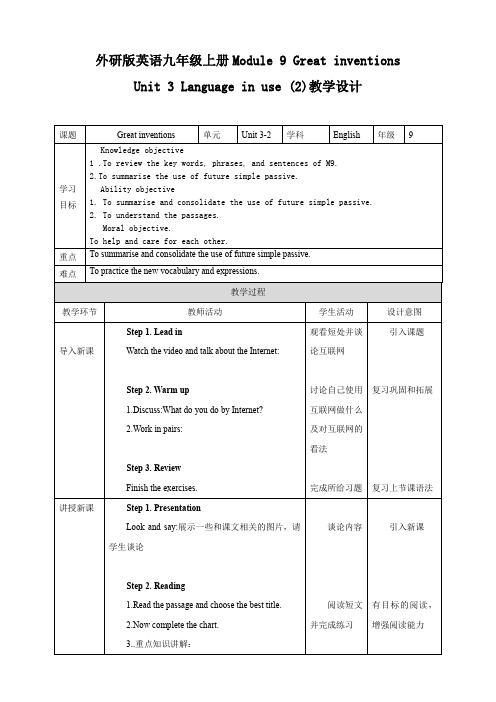
Ability objective
1. To summarise and consolidate the use of future simple passive.
2. To understand the passages.
教学过程
教学环节
教师活动
学生活动
设计意图
导入新课
Step 1. Lead in
Watch the video and talk about the Internet:
Step 2. Warm up
1.Discuss:What do you do by Internet?
2.Work in pairs:
板书
Module 9 Great inventions
Unit 3 Language in use (2)
in the 1960sallow sb. to do sth.
such ashundreds of millions of
across the worldinstead of
write notesin the near future
1.Read the passage and choose the best title.
2.Now complete the chart.
3..重点知识讲解:
1)in the +年代+s的用法
2)allow sb. to do sth.的用法
3)across the world的用法
4)instead of的用法
2.Discuss with your group.
外研版九年级英语上册Module9Unit3Languageinuse教案
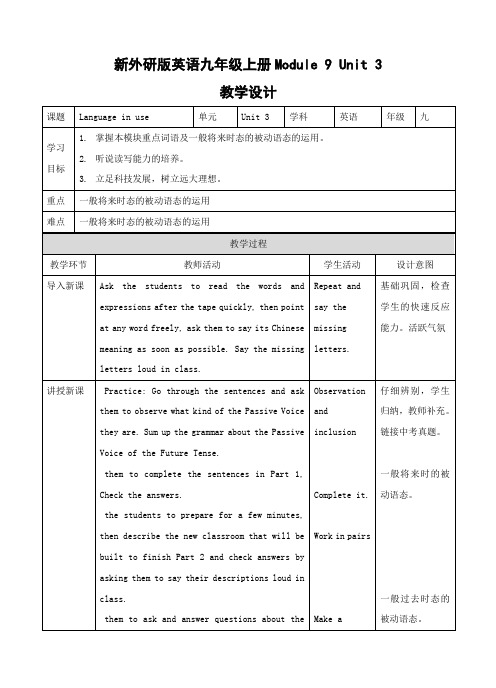
新外研版英语九年级上册Module 9 Unit 3教学设计great inventions in Part 3, check answers by asking so them to act their dialogues in pairs. At last, complete the sentences in Part 4.:a. Listen and find out where the speaker is to finish Part 5. Listen again and answer the questions in Part 6them to listen and read the passage in Part 7.Choose the best title, then complete the chart in it.Check answers, encouragement should be given. the world: E-bookstask: Discussing inventionsfor your discussionwith your groupyour findings to the class.:all the key words and sentences in Module 9. exercises about the Passive Voice.Module 10.dialogue.Listen andChoose.Complete thechart.Read.Discuss andpresent.Finish them.口语表达,词语运用。
培养听力能力。
培养阅读能力课外阅读培养合作创新能力。
课后巩固补充材料WWW是环球信息网的缩写,(英文全称为“World Wide Web”),分为Web客户端和Web服务器程序。
WWW可以让Web客户端(常用浏览器)访问浏览Web服。
外研版九年级英语教案:Module9Unit3Languageinuse

四、教学流程
外研版九年级英语教案:Module 9 Unit 3 Language in use
(一)导入新课(用时5分钟)
同学们,今天我们将要学习的是《Language in use》这一章节。在开始之前,我想先问大家一个问题:“你们在日常生活中是否遇到过用英语表达自己的想法或感受的困难?”(举例说明)这个问题与我们将要学习的内容密切相关。通过这个问题,我希望能够引起大家的兴趣和好奇心,让我们一同探索如何更好地使用英语进行沟通。
(2)时态混淆:学生在运用不同时态时容易混淆,尤其是在口语表达和写作中。
解决方法:通过对比、练习和实际场景设定,帮助学生明确各时态的用法和区别。
(3)句型结构掌握:学生对不同句型结构的掌握程度不一,影响语言表达的准确性。
解决方法:设计针对性的句型练习,如填空、改错等,让学生在实际操作中熟练掌握。
(4)跨文化交际:学生在实际交流过程中,难以把握不同文化背景下的语言表达方式。
举例:能在口语表达或写作中运用词汇描述语言学习的体会和交流过程。
(2)语法:熟练运用一般现在时、一般过去时和一般将来时,进行不同时间段的句子构建。
举例:学生能够根据不同时间背景,运用相应时态描述语言学习的重要性和实际应用。
(3)句型结构:掌握并运用一般疑问句、否定句、祈使句等句型进行有效沟通。
举例:在小组讨论或角色扮演活动中,学生能够使用不同的句型结构提问、回答或表达观点。
2.时态的掌握仍然是学生的一个难点。在小组讨论和角色扮演活动中,我发现有学生混淆了不同时态的用法。为了帮助学生更好地理解时态,我计划在下一节课中增加时态对比练习,让学生在实际语境中感受不同时态的用法。
2019秋外研版九年级英语上册Module9Unit3Languageinuse教案

在实践活动环节,学生们分组讨论和角色扮演活动进行得非常顺利。他们通过小组合作,积极思考,互相学习,提高了对不同时态的理解和应用。但同时,我也注意到部分学生在讨论过程中过于依赖同伴,缺乏独立思考。针对这一问题,我将在接下来的教学中,注重培养学生的独立思考能力。
-句型难点:通过设定不同场景,引导学生运用目标句型进行对话,如谈论过去、现在和未来的爱好、梦想等。
-阅读难点:指导学生通过略读、寻读等策略找到短文中的关键信息,理解并总结他人的生活经历。
在教学过程中,教师应针对这些重点和难点内容进行有针对性的讲解和强调,通过丰富的教学活动、实例分析和情景交际等方式,帮助学生透彻理解并掌握本节课的核心知识。同时,关注学生的学习反馈,及时解答学生的疑问,有效地突破教学难点。
2.文化意识目标:
a.增进学生对中外文化差异的了解,尊重并包容不同的生活方式和价值观。
b.通过学习英语,培养学生对英语国家的文化兴趣,提高跨文化交际意识。
3.学习能力目标:
a.培养学生自主学习能力,通过合作、探究等方式掌握英语知识,形成有效的学习策略。
b.鼓励学生勇于尝试、积极实践,面对挑战时保持积极的学习态度,培养持久的学习动力。
2019秋外研版九年级英语上册Module 9 Unit 3 Language in use教案
教学内容:
一、教学内容
2019秋外研版九年级英语上册Module 9 Unit 3 Language in use
1.知识目标:
2019年外研版九年级上册英语教案:Module9Unit3Languageinuse
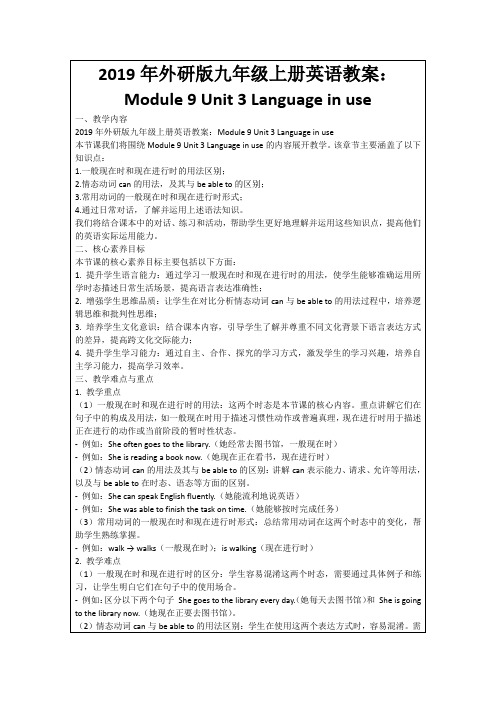
(三)实践活动(用时10分钟)
1.分组讨论:学生们将行时相关的实际问题。
2.实验操作:为了加深理解,我们将进行一个简单的角色扮演活动。这个活动将演示如何在实际对话中使用这两个时态。
2019年外研版九年级上册英语教案:Module 9 Unit 3 Language in use
一、教学内容
2019年外研版九年级上册英语教案:Module 9 Unit 3 Language in use
本节课我们将围绕Module 9 Unit 3 Language in use的内容展开教学。该章节主要涵盖了以下知识点:
-例如:go → goes(一般现在时);is going(现在进行时)
四、教学流程
(一)导入新课(用时5分钟)
同学们,今天我们将要学习的是Module 9 Unit 3 Language in use这一章节。在开始之前,我想先问大家一个问题:“你们在日常生活中是否遇到过描述正在进行的动作或描述某人经常做的事情的情况?”这个问题与我们将要学习的内容密切相关。通过这个问题,我希望能够引起大家的兴趣和好奇心,让我们一同探索一般现在时和现在进行时的奥秘。
(2)情态动词can与be able to的用法区别:学生在使用这两个表达方式时,容易混淆。需要通过实例讲解它们在不同语境下的使用。
-例如:区分以下两个句子She can sing very well.(她唱歌很好)和She is able to sing very well.(她能够唱得很好)。
(3)动词在一般现在时和现在进行时的变化:部分动词在变化过程中会出现不规则变化,学生需要重点掌握。
精选-外研版九年级英语上册Module 9 unit3 学案-文档
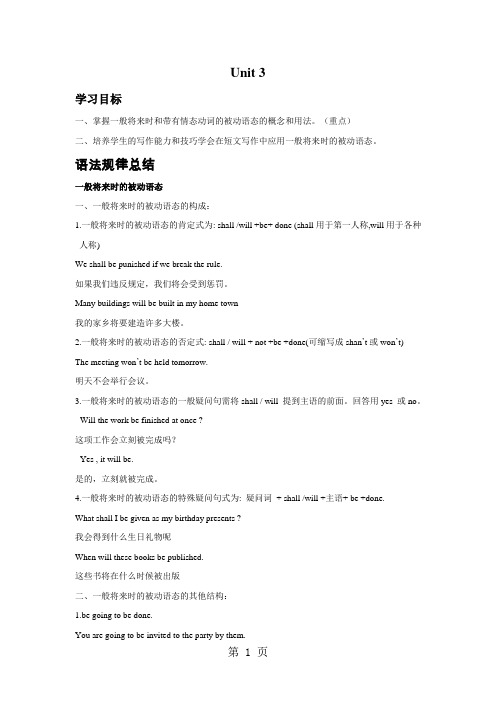
Unit 3学习目标一、掌握一般将来时和带有情态动词的被动语态的概念和用法。
(重点)二、培养学生的写作能力和技巧学会在短文写作中应用一般将来时的被动语态。
语法规律总结一般将来时的被动语态一、一般将来时的被动语态的构成:1.一般将来时的被动语态的肯定式为: shall /will +be+ done (shall用于第一人称,will用于各种人称)We shall be punished if we break the rule.如果我们违反规定,我们将会受到惩罚。
Many buildings will be built in my home town我的家乡将要建造许多大楼。
2.一般将来时的被动语态的否定式: shall / will + not +be +done(可缩写成shan’t或won’t)The meeting won’t be held tomorrow.明天不会举行会议。
3.一般将来时的被动语态的一般疑问句需将shall / will 提到主语的前面。
回答用yes 或no。
- Will the work be finished at once ?这项工作会立刻被完成吗?- Yes , it will be.是的,立刻就被完成。
4.一般将来时的被动语态的特殊疑问句式为: 疑问词+ shall /will +主语+ be +done.What shall I be given as my birthday presents ?我会得到什么生日礼物呢When will these books be published.这些书将在什么时候被出版二、一般将来时的被动语态的其他结构:1.be going to be done.You are going to be invited to the party by them.你将会被他们邀请参加那个晚会2.bo to be doneThe sports meeting is to be held on April 10.运动会将于4月10日举行三、一般将来时的被动语态的用法:1.一般将来时的被动语态同它的主动语态一样,表示根据计划或安排将要发生的被动性动作。
2016外研版九年级英语(上)Module9Unit3Languagepractice教案
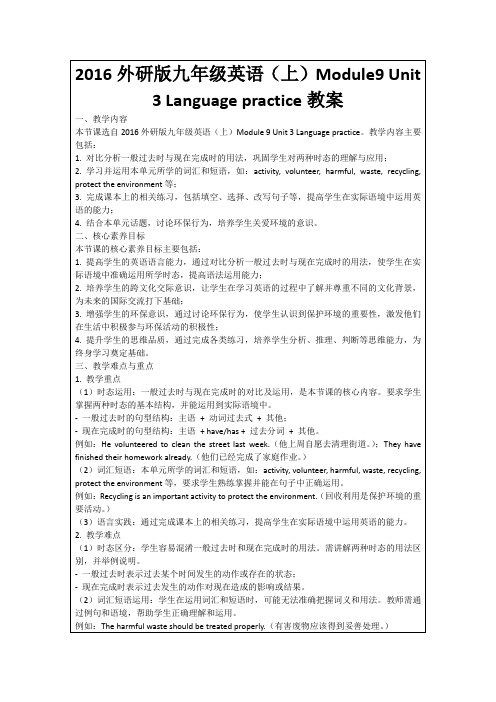
在今天的教学过程中,我发现学生们对一般过去时和现在完成时的区分仍然存在一定的困难。在讲解这两个时态时,我尝试通过生动的例子和比较来帮助他们理解,但显然还需要更多的练习和实际运用来巩固这一知识点。
课堂上,我注意到学生们在分组讨论和实践活动中的参与度很高,他们能够积极用英语表达自己的观点和想法。特别是在讨论环保活动在实际生活中的应用时,学生们提出了许多有创意的建议,这让我感到很欣慰。这说明我们的英语教学不仅仅让学生掌握了语言知识,还培养了他们的环保意识和实践能力。
(3)语言实践:通过完成课本上的相关练习,提高学生在实际语境中运用英语的能力。
2.教学难点
(1)时态区分:学生容易混淆一般过去时和现在完成时的用法。需讲解两种时态的用法区别,并举例说明。
-一般过去时表示过去某个时间发生的动作或存在的状态;
-现在完成时表示过去发生的动作对现在造成的影响或结果。
(2)词汇短语运用:学生在运用词汇和短语时,可能无法准确把握词义和用法。教师需通过例句和语境,帮助学生正确理解和运用。
二、核心素养目标
本节课的核心素养目标主要包括:
1.提高学生的英语语言能力,通过对比分析一般过去时与现在完成时的用法,使学生在实际语境中准确运用所学时态,提高语法运用能力;
2.培养学生的跨文化交际意识,让学生在学习英语的过程中了解并尊重不同的文化背景,为未来的国际交流打下基础;
3.增强学生的环保意识,通过讨论环保行为,使学生认识到保护环境的重要性,激发他们在生活中积极参与环保活动的积极性;
3.重点难点解析:在讲授过程中,我会特别强调一般过去时和现在完成时的用法这两个重点。对于难点部分,我会通过举例和比较来帮助大家理解。
(三)实践活动(用时10分钟)
1.分组讨论:学生们将分成若干小组,每组讨论一个与环保活动相关的实际问题,如如何用英语表达环保行为。
外研版英语九上Module9Unit3教案1

■Read Around the world.
Turn to page79. Let’s goaround the world by reading Classic American cartoons: Batman & Spiderman.
2.I’ve got a dictionarywhichhas got your name on it.
3.Perhaps it’ll be a TV playwhichhas a sad ending.
4.There are several English clubs in my schoolwhichhave held Speech Contest for the citizens.
4.There are several fan clubs inChinawhichhave held birthday parties for Tintin.
5.It tells the story of a monkeywholeads a group of monkeys.
1.The books (which/ that) I like have lots of pictures.
Unit3Languagein use
■Warm up by doing language practice.
Hi, let’s go to page 76. Make a study of thestructureof thefivesentencesin thebox. Then make similar sentences.
外研版-英语-九上-九上Module9 3单元 优秀教案
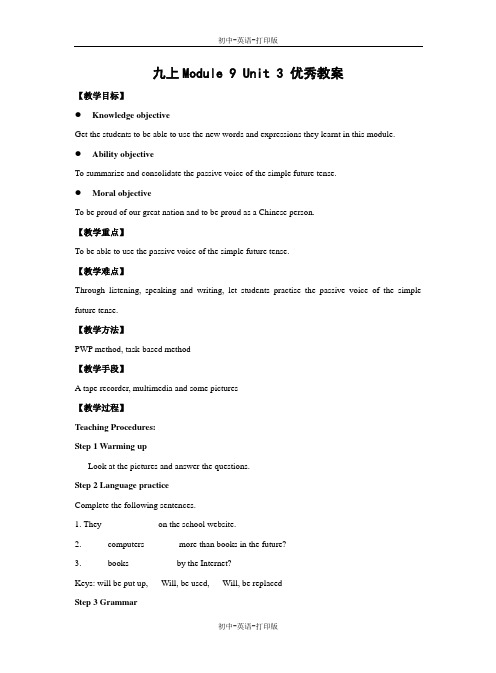
九上Module 9 Unit 3 优秀教案【教学目标】●Knowledge objectiveGet the students to be able to use the new words and expressions they learnt in this module.●Ability objectiveTo summarize and consolidate the passive voice of the simple future tense.●Moral objectiveTo be proud of our great nation and to be proud as a Chinese person.【教学重点】To be able to use the passive voice of the simple future tense.【教学难点】Through listening, speaking and writing, let students practise the passive voice of the simple future tense.【教学方法】PWP method, task-based method【教学手段】A tape recorder, multimedia and some pictures【教学过程】Teaching Procedures:Step 1 Warming upLook at the pictures and answer the questions.Step 2 Language practiceComplete the following sentences.1. They ____________ on the school website.2. _____ computers _______ more than books in the future?3. _____ books __________ by the Internet?Keys: will be put up, Will, be used, Will, be replacedStep 3 GrammarThe structure of the passive voice.Step 4 Complete the sentences and conversations with the correct form of the words and expressions in brackets1. ____ books ________ (replace) by computers in the future?2. My bike is broken. It _________ (fix) tomorrow.3. —Dad, can I use the Internet this evening?—Yes, but the computer is not on yet. The electricity ___________ (not connect) until nine o’clock.4. _____ the problem _____________ (talk about) at the meeting tomorrow?5. Who ____________ (invite) to give a report about great inventions next Friday?6. —When _____ the work __________ (finish)?—In two days.Keys: 1. Will, be replaced 2. will be fixed 3. won’t be connected 4. will be talked about5. will be invited6. will, be finishedStep 5 Look and sayLook at the pictures and describe the new classroom that will be built. Use the words in the box to help you.build, buy, changeA new classroom will be built.Keys: A new floor will be built.New furniture (desk/ chairs) will be bought.A new blackboard will be bought.The windows and the door will be changed.The teacher’s desk will be p ainted.The lights will be changed.The color of the walls will be changed.The walls will be fixed.…Step 6 TalkingWork in pairs. Talk about these great inventions.●1875●America●Alexander Graham BellA: When was the telephone invented?B: It was invented in 1875.…A: What kind of telephone do you think will be made in the future? B: …●1903●America●Wright Brothers●1924●Britain●John Logie BairdStep 7 Complete the sentences with the words in the box direction, introduction, spread, trade 1Before the ___________ of printing, few people could read.2There were more books to sell, so the _____ in books grew.3Because more people could read, ideas ______ quickly.4What ________ will printing take in the future?Keys: introduction, trade, spread, directionStep 8 Listening1. Listen and find out where the speaker is.a). In a school library.b). In the British Library.c). In the British Museum.Keys: b2 .Listen again and answer the questions.1. Why were so few books produced in ancient times?2. Why were many old books copied onto a computer?3. How has the computer helped people read old books in the British Library?Keys: 1. Because they were written by hand.2. They are too valuable to be picked up and held in the hand.3. Old books were copied onto a computer a few years ago for people to be able toread them without touching them.Step 9 Reading1.Read the passage and choose the best title.a) The history of the Internetb) The World Wide Webc) The Internet and the Webd) The future of the InternetKeys: c2.Read the passage and answer the questions.1. When was the Internet invented by the US government?2. What could people only send at first?3. Who invented the World Wide Web in 1991?4. Can people use e-commerce and online shopping to buy and sell things?Keys: 1. In the 1960s.2. They could only send very simple texts.3. A British scientist named Tim Berners-Lee.4. Yes, they can.3.Now complete the time table.In the 1960s: The Internet was invented for the army to use.In the 1970s: Scientists and businesspeople wanted to use the Internet to send and receive messages.In 1991: The World Wide Web was invented.In the 1990s: More and more people started to use the Internet to send various types of files.Today: The Web has hundreds of millions of users. It has changed the way people live, work and play.Step 10 Around the worldTo learn about e-books.Step 11 Discussion1.Work in groups. Prepare for your discussion.•Think of an invention that has changed your life.•Make notes about the invention:1 What is it?2 Why is it useful?•Research how the invention has been developed and make notes about what you find out.2.Discuss with your group.Tell your group about the invention. Ask them for their ideas.Make notes about your discussions.3.Present your findings to the class.Step 12中考链接1.The sports meeting _____ next month.A. will holdB. is going to holdC. will be held2. From May 6, pedestrians (行人) _____ 10 yuan if they run red lights, according to Beijingtraffic authorities.A. will fineB. were finedC. are fineD. will be fined3. -A new park _____ in our hometown next year.-Really? Our hometown must be more beautiful.A. will buildB. will be builtC. is built4. It is said that an Asian Culture Village ______ inside the AYG, Village in Nanjing in thecoming Asian Youth Games period.A. buildsB. is buildingC. will be builtD. was built5. —How many people will _____ to yourbirthday party?—Twelve.A. inviteB. be invitedC. be invitingKeys: C, D, B, C, BStep 13 Homework你的朋友Jim迷恋上网,经常逃学,成绩下降。
外研版九年级上册教案M9U3
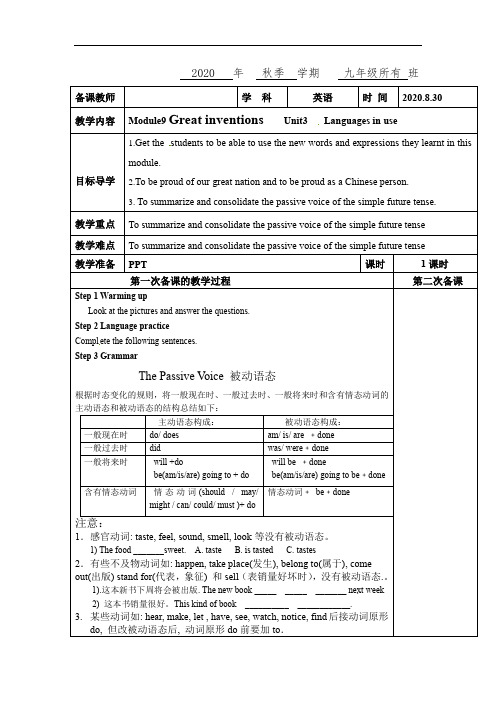
2020 年秋季学期九年级所有班Module9 Great inventions Unit3 Languages in use1.Get the students to be able to use the new words and expressions they learnt in thismodule.2.To be proud of our great nation and to be proud as a Chinese person.3. To summarize and consolidate the passive voice of the simple future tense.第一次备课的教学过程Step 1 Warming upLook at the pictures and answer the questions.Step 2 Language practiceCompl ete the following sentences.Step 3 GrammarThe Passive V oice 被动语态根据时态变化的规则,将一般现在时、一般过去时、一般将来时和含有情态动词的主动语态和被动语态的结构总结如下:主动语态构成:被动语态构成:一般现在时do/ does am/ is/ are ﹢done一般过去时did was/ were﹢done一般将来时will +dobe(am/is/are) going to + do will be ﹢donebe(am/is/are) going to be﹢done含有情态动词情态动词(should / may/might / can/ could/ must )+ do情态动词﹢be﹢done注意:1.感官动词: taste, feel, sound, smell, look等没有被动语态。
1) The food _______sweet. A. taste B. is tasted C. tastes2.有些不及物动词如: happen, take place(发生), belong to(属于), comeout(出版) stand for(代表,象征) 和sell(表销量好坏时),没有被动语态.。
外研版九年级上册英语《Module 9 Great inventions Unit 3》集体备课教学
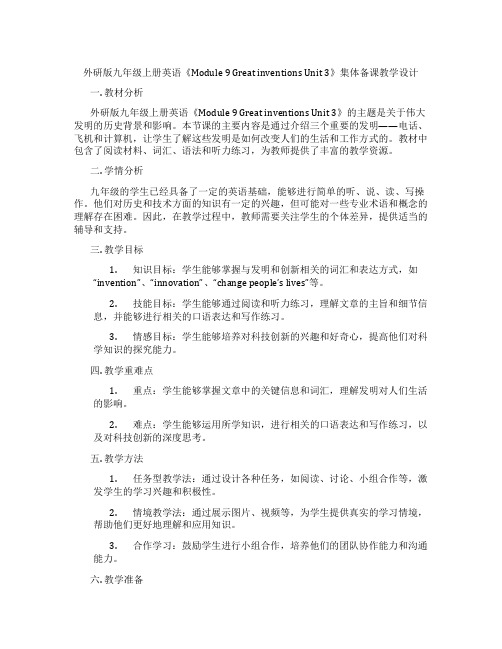
外研版九年级上册英语《Module 9 Great inventions Unit 3》集体备课教学设计一. 教材分析外研版九年级上册英语《Module 9 Great inventions Unit 3》的主题是关于伟大发明的历史背景和影响。
本节课的主要内容是通过介绍三个重要的发明——电话、飞机和计算机,让学生了解这些发明是如何改变人们的生活和工作方式的。
教材中包含了阅读材料、词汇、语法和听力练习,为教师提供了丰富的教学资源。
二. 学情分析九年级的学生已经具备了一定的英语基础,能够进行简单的听、说、读、写操作。
他们对历史和技术方面的知识有一定的兴趣,但可能对一些专业术语和概念的理解存在困难。
因此,在教学过程中,教师需要关注学生的个体差异,提供适当的辅导和支持。
三. 教学目标1.知识目标:学生能够掌握与发明和创新相关的词汇和表达方式,如“invention”、“innovation”、“change people’s lives”等。
2.技能目标:学生能够通过阅读和听力练习,理解文章的主旨和细节信息,并能够进行相关的口语表达和写作练习。
3.情感目标:学生能够培养对科技创新的兴趣和好奇心,提高他们对科学知识的探究能力。
四. 教学重难点1.重点:学生能够掌握文章中的关键信息和词汇,理解发明对人们生活的影响。
2.难点:学生能够运用所学知识,进行相关的口语表达和写作练习,以及对科技创新的深度思考。
五. 教学方法1.任务型教学法:通过设计各种任务,如阅读、讨论、小组合作等,激发学生的学习兴趣和积极性。
2.情境教学法:通过展示图片、视频等,为学生提供真实的学习情境,帮助他们更好地理解和应用知识。
3.合作学习:鼓励学生进行小组合作,培养他们的团队协作能力和沟通能力。
六. 教学准备1.教材和教学资源:准备《Module 9 Great inventions Unit 3》的教材和相关教学资源,如PPT、阅读材料、听力材料等。
Module9Unit3教案-外研版九年级上册英语

在实践活动环节,小组讨论和实验操作让学生们积极参与,但我注意到一些学生在表达自己的观点时还不够自信。这可能是因为他们对语言表达的信心不足。为此,我计划在接下来的课程中,更多地鼓励学生开口说英语,为他们提供更多的支持和鼓励。
3.重点难点解析:在讲授过程中,我会特别强调一般过去时的被动语态和描述发明过程的句型。对于难点部分,我会通过例句和对比来帮助大家理解。
(三)实践活动(用时10分钟)
1.分组讨论:学生们将分成若干小组,每组讨论一深理解,我们将进行一个简单的实验操作,如模拟一个简单的发明过程,演示如何将一个想法变成现实。
四、教学流程
(一)导入新课(用时5分钟)
同学们,今天我们将要学习的是Module 9 Unit 3《Inventors and Inventions》。在开始之前,我想先问大家一个问题:“你们在生活中有没有遇到过一些问题,然后想要发明一样东西来解决它?”(例如:想要一个可以帮助做家务的机器人)。这个问题与我们将要学习的内容密切相关。通过这个问题,我希望能够引起大家的兴趣和好奇心,让我们一同探索发明创造的奥秘。
-句型:掌握句型如"It was...who invented..."和"He was inspired by..."等,有助于学生准确地表达发明家和发明之间的关系。
-阅读理解:通过阅读文章《Edison and His Inventions》,学生需要学会提取关键信息,理解发明家的发明过程及其对世界的影响。
外研版英语九上Module9Unit3Languageinuseword教案

Module 9 Cartoon storiesUnit 3 Language in use课型:单元复习课复习内容:1、重点词汇:cartoon flash drawing mess heaven private heart everywhere heart handbagfavourite lead rule peach common boss surface experience creator cartoonist2、重点短语:1 over there 那边2 have a word with…和某人说几句话3 go over 往(……的地方)4 in deep trouble 陷入大麻烦5 win the heart of 赢得……的心6 make a mess 制造混乱7 Havoc in Heaven 《大闹天宫》8 ever since 自从……9 the whole series of 整个系列3、重点句型:1).It’s no laughing matter. 这不是闹着玩的事情。
2).Here you are. 给你。
3) That’s good news. 那是个好消息。
4) I’ve got a camera which has got his name on it.我拿到一个上面有他名字的相机。
5) His books have been translated into…他的书被翻译成……4、主要语言点1) If Tony tells his dad that he’s lost the camera he borrowed, he’ll be in deep trouble.2) This isn’t one of those cartoons which make you laugh.3) In December 1984 the whole series of Tintin began to be published in China.4) Tintin has been popular for 75 years, ever since Belgian cartoonist Herge invented thecharacter in 1929.5) His books have been translated into more than 50 languages…6) He gets the idea for his funny stories or characters by looking at websites for daily newsand events5、本单元的对话和短文。
- 1、下载文档前请自行甄别文档内容的完整性,平台不提供额外的编辑、内容补充、找答案等附加服务。
- 2、"仅部分预览"的文档,不可在线预览部分如存在完整性等问题,可反馈申请退款(可完整预览的文档不适用该条件!)。
- 3、如文档侵犯您的权益,请联系客服反馈,我们会尽快为您处理(人工客服工作时间:9:00-18:30)。
九上Module 9 Unit 3 教案【教学目标】Knowledge objectiveGet the students to be able to use the new words and expressions they learnt in this module.Ability objectiveTo summarize and consolidate the passive voice of the simple future tense.Moral objectiveTo be proud of our great nation and to be proud as a Chinese person.【教学重点】To be able to use the passive voice of the simple future tense.【教学难点】Through listening, speaking and writing, let students practise the passive voice of the simple future tense.【教学方法】PWP method, task-based method【教学手段】A tape recorder, multimedia and some pictures【教学过程】Teaching Procedures:Step 1 Warming upLook at the pictures and answer the questions.Step 2 Language practiceComplete the following sentences.1. They ____________ on the school website.2. _____ computers _______ more than books in the future?3. _____ books __________ by the Internet?Keys: will be put up, Will, be used, Will, be replacedStep 3 GrammarThe structure of the passive voice.一般现在时一般过去时一般将来时肯定主语+am/is/are +done 主语+ was/were +done 主语+will/ be (am/is/are) going to +be +done否定主语+am/is/are + not+done 主语+was/were +not+done 主语+will/ be (am/is/are) not+going to+be+done一般现在时一般过去时一般将来时一般疑问Am/Is/Are+主语+done Was/Were+主语+done Will+主语+be+done/ Be (am/is/are)+主语+going to +be+done一般现在时一般过去时一般将来时特殊疑问特殊疑问词+am/is/are+主语+done 特殊疑问词+was/were+主语+done 特殊疑问词will+主语+be+done/特殊疑问词be(am/is/are)+主语+going to+be+doneStep 4 Complete the sentences and conversations with the correct form of the words and expressions in brackets1. ____ books ________ (replace) by computers in the future?2. My bike is broken. It _________ (fix) tomorrow.3. —Dad, can I use the Internet this evening?—Yes, but the computer is not on yet. The electricity ___________ (not connect) until nine o’clock.4. _____ the problem _____________ (talk about) at the meeting tomorrow?5. Who ____________ (invite) to give a report about great inventions next Friday?6. —When _____ the work __________ (finish)?—In two days.Keys: 1. Will, be replaced 2. will be fixed 3. won’t be connected 4. will be talked about5. will be invited6. will, be finishedStep 5 Look and sayLook at the pictures and describe the new classroom that will be built. Use the words in the box to help you.build, buy, changeA new classroom will be built.Keys: A new floor will be built.New furniture (desk/ chairs) will be bought.A new blackboard will be bought.The windows and the door will be changed.The teacher’s desk will be pain ted.The lights will be changed.The color of the walls will be changed.The walls will be fixed.…Step 6 TalkingWork in pairs. Talk about these great inventions.●1875●America●Alexander Graham BellA: When was the telephone invented?B: It was invented in 1875.…A: What kind of telephone do you think will be made in the future?B: …●1903●America●Wright Brothers●1924●Britain●John Logie BairdStep 7 Complete the sentences with the words in the boxdirection, introduction, spread, trade1 Before the ___________ of printing, few people could read.2 There were more books to sell, so the _____ in books grew.3 Because more people could read, ideas ______ quickly.4 What ________ will printing take in the future?Keys: introduction, trade, spread, directionStep 8 Listening1. Listen and find out where the speaker is.a). In a school library.b). In the British Library.c). In the British Museum.Keys: b2 .Listen again and answer the questions.1. Why were so few books produced in ancient times?2. Why were many old books copied onto a computer?3. How has the computer helped people read old books in the British Library?Keys: 1. Because they were written by hand.2. They are too valuable to be picked up and held in the hand.3. Old books were copied onto a computer a few years ago for people to be able to read themwithout touching them.Step 9 Reading1. Read the passage and choose the best title.a) The history of the Internetb) The World Wide Webc) The Internet and the Webd) The future of the InternetKeys: c2. Read the passage and answer the questions.1. When was the Internet invented by the US government?2. What could people only send at first?3. Who invented the World Wide Web in 1991?4. Can people use e-commerce and online shopping to buy and sell things?Keys: 1. In the 1960s.2. They could only send very simple texts.3. A British scientist named Tim Berners-Lee.4. Yes, they can.3. Now complete the time table.In the 1960s: The Internet was invented for the army to use.In the 1970s: Scientists and businesspeople wanted to use the Internet to send and receive messages.In 1991: The World Wide Web was invented.In the 1990s: More and more people started to use the Internet to send various types of files. Today: The Web has hundreds of millions of users. It has changed the way people live, work and play.Step 10 Around the worldTo learn about e-books.Step 11 Discussion1. Work in groups. Prepare for your discussion.•Think of an invention that has changed your life.•Make notes about the invention:1 What is it?2 Why is it useful?•Research how the invention has been developed and make notes about what you find out.2. Discuss with your group.Tell your group about the invention. Ask them for their ideas.Make notes about your discussions.3. Present your findings to the class.Step 12中考链接1. The sports meeting _____ next month.A. will holdB. is going to holdC. will be held2. From May 6, pedestrians (行人) _____ 10 yuan if they run red lights, according to Beijing traffic authorities.A. will fineB. were finedC. are fineD. will be fined3. -A new park _____ in our hometown next year.-Really? Our hometown must be more beautiful.A. will buildB. will be builtC. is built4. It is said that an Asian Culture Village ______ inside the AYG, Village in Nanjing in the coming Asian Youth Games period.A. buildsB. is buildingC. will be builtD. was built5. —How many people will _____ to yourbirthday party?—Twelve.A. inviteB. be invitedC. be invitingKeys: C, D, B, C, BStep 13 Homework你的朋友Jim迷恋上网,经常逃学,成绩下降。
